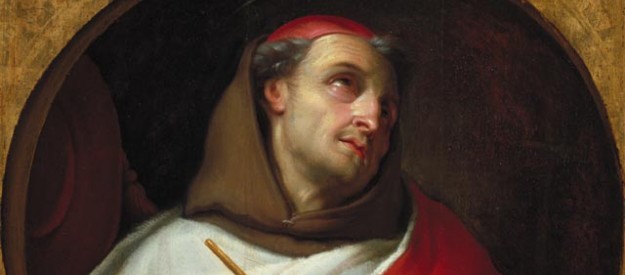"We are losing our attitude of wonder, of contemplation, of listening to creation and thus we no longer manage to interpret within it what Benedict XVI calls 'the rhythm of the love-story between God and man.'"
+ Pope Francis
The implications of Bonaventure

With today's Feast day of St. Bonaventure, it's a perfect time to consider how the life of this saint has influenced the Church, especially through the thought of Joseph Ratzinger/Benedict XVI. This is all especially helpful given both men's appreciation of the natural order and the beauty of nature.
There's a nice post at CatholicCulture.org on the basics of Bonaventure. It's a reprint of a March 2010 audience of Pope Benedict XVI. It is one of many places where B16 called attention to the thirteenth century follower of St. Francis.
What is the reason for Ratzinger's affinity for Bonaventure?
The young Ratzinger and the elderly Benedict XVI deeply appreciated how St. Bonaventure helped the Church embrace the beauty of nature as a means to knowing God, as well as a view of history that places an importance on God's loving activity in it—through us.
To fully appreciate why this is so, I rely on my graduate thesis and my farewell post to Benedict XVI. Here are the basics: In the mid 1950s as he worked to become a university professor of theology with lecturing rights, the young Fr. Ratzinger was prompted by his academic advisors to study St. Bonaventure. And so after his first doctoral thesis on St. Augustine, he was required to write a second doctoral thesis, which was required by the German theological academy for anyone seeking to teach.
Ratzinger's topic for this thesis was St. Bonaventure's view of history and revelation. The thesis caused great turmoil in large part because of disagreement between Ratzinger's advisers. It may surprise some today to hear this, but some of these advisers challenged the young theologian that he would become "dangerously modern" with his work on Bonaventure's view of scripture having a "historical character." But Ratzinger (and the other advisers) won the day. The result was a substantial work that has added greatly to the Catholic academic corpus
Something else took place in writing this thesis that is important for the present conversation. Ratzinger's study of Bonaventure was specific to an episode within the young Franciscan Order. Not long after the death of Francis, a faction of the order known as the "spiritualists" found themselves at odds with orthodoxy. These Franciscans followed and somewhat misinterpreted the writings of a twelfth century abbot, Joachim of Fiore, who seemed to have made a series of intriguing predictions about a "new age" and who saw the story of the Church as an active one because history was far from stagnant—which, by the twelfth century, seemed fairly obvious.
While the details of the matter are too great to delve into here (you can see my thesis or this briefer essay for those) what is important for understanding Ratzinger's development and his eventual championing of Catholic ecology was how he witnessed in Bonaventure a pastor who was both unafraid of worldly change and was able to lovingly find ways to call errant members of his flock home.
Bonaventure was able to offer the spiritualists a way back to orthodoxy by providing a fair reading of their works and finding aspects within it that had value. As a result, Bonaventure added to Christian thought the sense of revelation interacting with history—of grace baptizing new historical realities because of what Ratzinger would describe in his thesis as the "obligation" for disciples of Christ to sacrificially "love in the present."
From such influences, we can see how a young (and elderly) Ratzinger/Pope Benedict XVI stresses that Christian love—acting within history—is the antidote for all that disfigures the world. This emphasis is why, I argue for instance, that Benedict XVI's first major letter to the Church was on the topic that God is Love.
For the Catholic ecologist, God's love is what humanity must accept and infuse within our own activities—and thus be placed within the dynamics of human history— if we are to live in accordance with the laws of nature, and so better protect the beauty of the cosmos—a beauty that St. Bonaventure often reminded us could lead us along our journey to God.


















